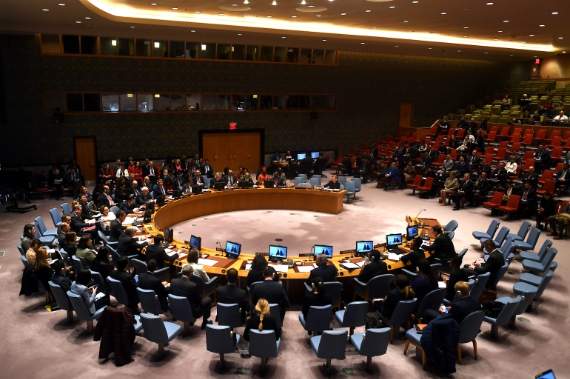The United Nations Security Council has called for the withdrawal of all foreign forces and mercenaries from Libya “without further delay” in a unanimously approved declaration.
It also welcomed the Libyan parliament’s approval of a new unified government on Wednesday, which is set to lead the North African country to December elections after a decade of conflict following the removal of dictator Muammar Gaddafi.
“The Security Council calls on all parties to implement the ceasefire agreement in full and urges member states to respect and support the full implementation of the agreement,” the statement on Friday approved by all 15 council members said.
According to the global body, about 20,000 foreign troops and mercenaries remained in Libya at the end of 2020, and no withdrawals have been observed since.
“The Security Council calls for full compliance with the UN arms embargo by all member states, in line with the relevant Security Council resolutions,” the text said. Experts say the embargo has been repeatedly violated.
Libya, a major oil producer, has been mired in conflict since the 2011 NATO-backed uprising against Gaddafi.
The sometimes chaotic war has drawn in several outside powers and a floor of foreign arms and mercenaries.
Since 2015, the country has been split between the UN-recognised Government of National Accord (GNA) in Tripoli and a rival administration in the east, allied to renegade military commander Khalifa Haftar.
In April 2019, Haftar and his self-styled Libyan National Army (LNA), backed by Egypt, the United Arab Emirates and Russia launched an offensive to try and capture Tripoli.
His campaign collapsed after Turkey stepped up its military support for the GNA, with hundreds of troops and thousands of mercenaries arriving from Syria.
A ceasefire agreement reached in October called for the withdrawal of all foreign forces and mercenaries in three months and adherence to a UN arms embargo, provisions which have not been met.
In January, the United States called on Russia, Turkey and the UAE to immediately halt their military interventions. Russia’s UN Mission said at the time that it did not have any military personnel “on Libyan soil” but did not exclude the possibility of mercenaries.
Last year, UN experts said the Wagner Group, a private Russian security company, had provided between 800 and 1,200 mercenaries to Haftar. There are thousands of mercenaries in Libya also from Syria, Sudan and Chad, according to Security Council diplomats.
A UN advance team is in Libya as a first step to sending international monitors under a UN umbrella to observe the ceasefire. It is expected to return next week.
The Security Council underlined “the importance of a credible and effective Libyan-led Ceasefire Monitoring Mechanism under UN auspices”. Council members said they look forward to receiving proposals from Secretary-General Antonio Guterres after the advance team returns on its “tasks and scale”.
The council statement called on the interim government to make preparations for December’s presidential and parliamentary elections “including arrangements to ensure the full, equal and meaningful participation of women”.
It also called on the interim government to prioritise implementation of the October ceasefire agreement, improve the delivery of services to the Libyan people, launch a comprehensive national reconciliation process, and adhere to international humanitarian law including the protection of civilians.
Looking ahead, the council said plans are needed “for the disarmament, demobilisation and reintegration of armed groups, security sector reform and to establish an inclusive, civilian-led security architecture for Libya as a whole”.










